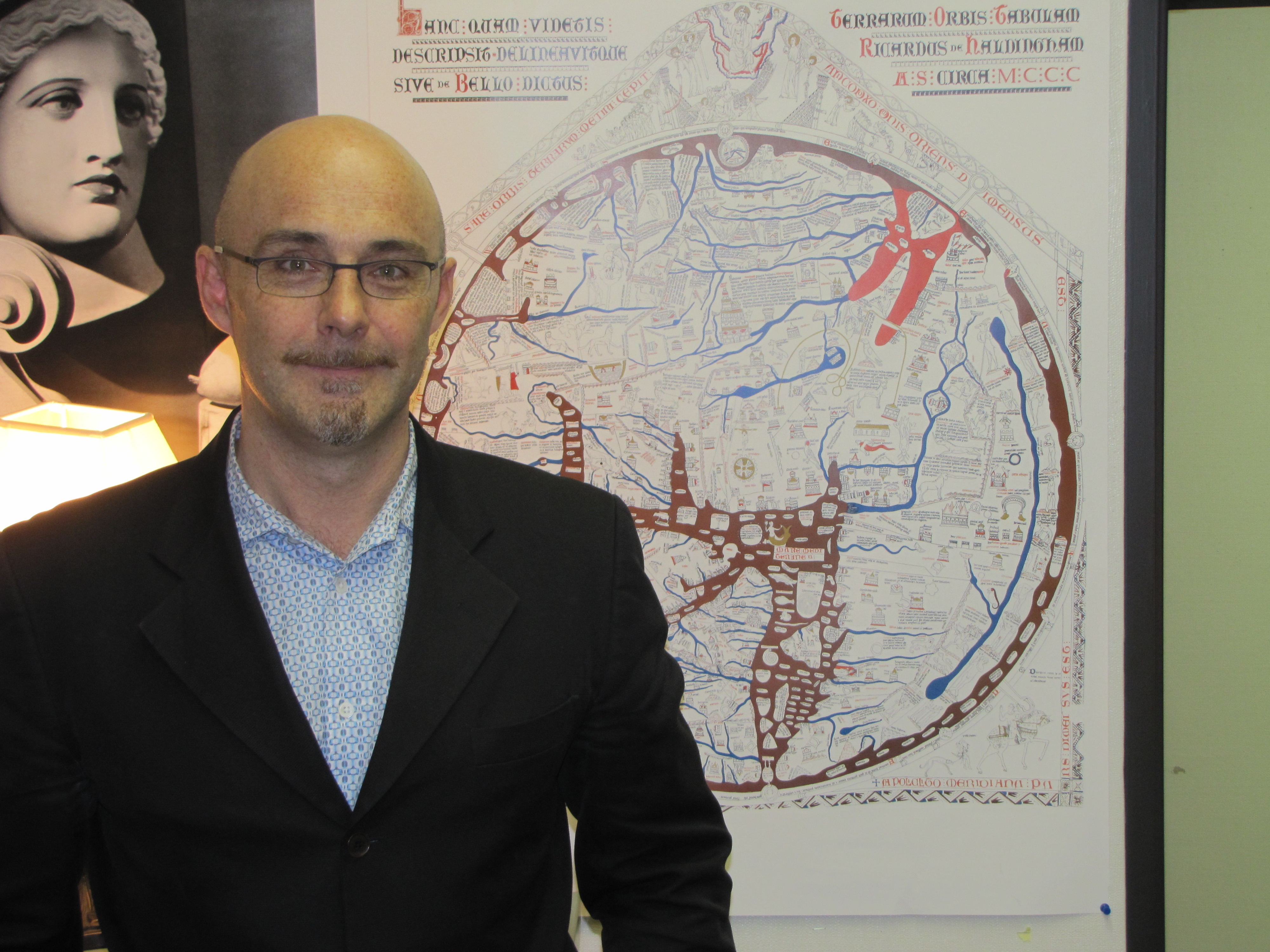Tuesday, Mar 8, 2011
Dr. Matthew Boyd Goldie has been awarded a McColl Research Fellowship from the American Geographical Society Library at the University of Wisconsin-Milwaukee. There, he will explore how the British Isles were considered in contrast to other landmasses in the 13th through 15th centuries, as well as the perceived effects of their insularity on their civilizations and cultures.
by Sean Ramsden
After traveling from his native New Zealand to Brooklyn College for a Master of Fine Arts, Dr. Matthew Boyd Goldie was already well acquainted with the geography of the earth – at least by modern standards.
Now that has been awarded a McColl Research Fellowship from the American Geographical Society Library at the University of Wisconsin-Milwaukee, Goldie intends to deepen his familiarity with the earth’s geography as it was understood by his scholarly ancestors from the Middle Ages. The library, which contains North America’s foremost geography and map collections – some 500,000 maps of all types covering the globe on a range of scales – will provide the ideal setting for the subject of Goldie’s latest research: How were the British Isles thought of in contrast to other landmasses in the 13th through 15th centuries? And what were the perceived effects of their insularity on their civilizations and cultures?
Goldie, a professor of English at Rider, found himself interested in the Middle Ages during his doctoral studies at the Graduate Center of the City University of New York. During those years, he focused on medieval English literature and post-colonial literature from the Pacific, Caribbean, Africa and India.
“I got seduced by the Middle Ages because it was harder, more of a challenge, and weirder. It’s a strange world, the Middle Ages. It’s familiar and unfamiliar,” he explained. “There are enduring themes we expect in literature and things we don’t expect.”
The highly competitive McColl Fellowship was established to attract visiting scholars whose research can benefit from extensive use of the American Geographical Society Library’s collections and who are interested in sharing their results with a broad, educated audience. As per the terms of the Fellowship, Goldie will spend a month in residence at the Library, during which time the grant will cover his expenses.
Goldie’s research stems, in large part, from work he did for his 2009 book, The Idea of the Antipodes, published by Routledge Press. In it, he combined his passion for medieval literature and poetry with his native background and knowledge of global literature to explore ideas about the opposite sides of the earth. The antipodes, derived from the ancient Greek for “opposite feet,” describe any two places or regions on diametrically opposite sides of the Earth. In particular, the scholarly work focuses on how people view the earth from where they stand from the ancient Greek times to today. In his research, Goldie refers to a wide variety of poems and prose, maps, scientific essays, artworks, and other texts.
For the McColl Fellowship, Goldie says that despite Britain’s physical insularity, the realm of England grew to be much more far-reaching from 1100 through 1500, the period he will examine, and this is reflected in the maps of the time.
“The concept of what is ‘English’ is developing during this period,” explained Goldie, who said that evidence of the nation’s spreading influence can be seen in the literature of Geoffrey Chaucer and the chronicles of Gerald of Wales. “England was, in fact, not insular, and included Calais and other large parts of France.”
While we tend to think of coastlines as borders, Goldie says that in the case of England, the seas that surrounded the nation’s land expanded its culture and commerce. “One historian has said that coasts are places of interactions where cultures meet rather than places of division,” he explained.
Though the era was, to England, still pre-imperialist, deepening trade routes and the expansion of religion also saw the English recognized in such remote locales as Jerusalem and the Far East.
“We think of globalization as a late 20th-century phenomenon, but even in the Middle Ages, we see that they think of themselves as part of a globe,” Goldie said. “They were very aware of the Middle East, Asia, and the Mongol empire, peoples who were, in turn, interested in the West.”
The period maps Goldie will study in Milwaukee reflect the view cartographers held of influential countries, trading a level of geographic accuracy for a more interpretive view of the globe. While the American Geographical Society Library doesn’t possess a great number of primary geographic material from the Middle Ages, Goldie says it does have all the secondary materials, which reveal a great deal about the era besides the terrain itself.
“Maps are major artistic, historical, and literary artifacts,” said Goldie, who explained that they also provide insights of anthropological, geographical, mythological, religious, and sociological value. “People gained an understanding from them, just as when you might look at an encyclopedia to figure out where you are and where you come from.”
Goldie presented aspects of The Idea of the Antipodes at the International Medieval Congress at Leeds, England, and at the New Chaucer Society Congress in Siena, Italy, during the summer of 2010. He has been recently invited to give talks at Princeton University and before the Delaware Valley Medieval Association at Rutgers University. His renewed focus on the islands in the Middle Ages prompted him to launch the research that led to the McColl Fellowship.
“The Fellowship presumes I will publish my findings, and there is an audience interested in this examination of British insularity,” he said. He also looks forward to teaching aspects of his research in his Medieval Literature and Global Literature courses in Rider’s Department of English.

